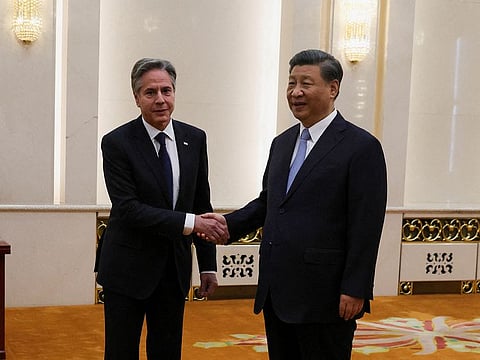Breaking Barriers: Was Blinken's Beijing trip a diplomatic success?
US and China must continue to hold conversations and sort out their differences amicably

The US Secretary of State Antony Blinken’s visit to Beijing last month is a welcome development. The relations between the two economic powers have been so fraught recently that even a hint of conflict aversion is a welcome news.
Chinese President Xi Jinping welcomed “progress” after shaking hands with Blinken at the Great Hall of the People, a grand venue usually reserved for greeting heads of state.
Sino-American relations starting plummeting during the Trump presidency and the slide has since continued. It started the with imposition of American duties on several Chinese products with China retaliating tit for tat. It went beyond verbal sparring, trade, sanctions or semiconductor supplies and extended dangerously into security and strategic issues.
The two super powers are following totally different strategies in extending their outreach to other countries. The US is focusing upon military alliances symbolised by Quad (US, Japan, India and Australia), AUKUS (Australia, UK and US) that includes introduction on nuclear technology in the region, and the recent military deal with the Philippines allowing additional base facilities and US attempts to nudge Japan and South Korea into more active military roles.
Risk of miscalculation
The Chinese make no secret of the threat posed by multiple American military bases around China. With the increased military presence and activity in the region, the risk of miscalculation or an accidental military incident have increased manifold.
China, on the other hand is following the path of economic engagement by launching the largest trade deal in history in the shape of Regional Comprehensive Economic Partnership (RCEP) and then formally applying to join Comprehensive and Progressive Agreement for Trans-Pacific Partnership (CPTPP). No wonder China is now the biggest trading partner of all the countries of the region and much of the world.
Polarisation in the American political system also poses a major challenge in seeking reproachment with China. With the election year approaching the Republican Party leadership is on the attack accusing Biden of appeasement towards China when the US Secretary of State only visited Beijing merely to keep the channels of communications open. Depending upon where the polls go this continued Republican vitriol may tempt the Biden administration to take a harder stance vis-a-vis Beijing.
No indications of a breakthrough
Though Blinken’s two days visit appeared to stabilise their intense rivalry so that it does not veer into conflict, there are no indications of a breakthrough in any of the areas of disagreement between the two.
Without guaranteeing a partnership between China and the US the talks show that the two are at least attempting to find working arrangement on which so much depends the world over. Both say that they want to reduce friction but refuse to budge on their strategic assessments. For now it is too early to say if the visit has advanced relations or if it can prevent relations from getting worse.
Notwithstanding, the competition between the two, the US should be prudent and cautious in handling the situation. Allowing space for the two as President Xi suggested, as the senior power, the US could offer a ‘grand bargain’ whereby the US leaves the Taiwan issue to be decided between Beijing and Taipei in exchange for unhindered freedom of civilian navigation for the US and other major powers in the South China Sea.
China may also wisely accommodate more than half way with the other claimant state in the South China Sea and thus disallow them a chance for seeking US military presence in the region.
Sajjad Ashraf served as an adjunct professor at the Lee Kuan Yew School of Public Policy, National University of Singapore from 2009 to 2017. He was a member of Pakistan Foreign Service from 1973 to 2008 and served as an ambassador to several countries.
Sign up for the Daily Briefing
Get the latest news and updates straight to your inbox



